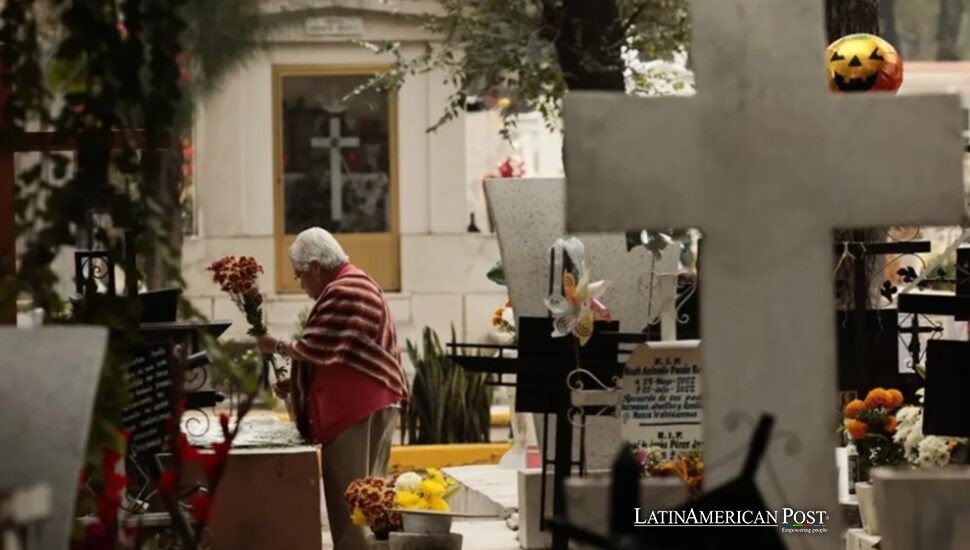Mexico’s Mothers Counting Graves While Leaders Count Political Wins

In Guanajuato, a mother counts her dead and missing while the state counts victories. As disappearances surge under President Claudia Sheinbaum, the searchers themselves are being hunted. Mexico’s crisis is statistical and intimate, systemic and personal, and denial only deepens the grave.
A Private Grief in a Public War
“My son dropped dead there,” said Eva María Vázquez, pointing to the unfinished house in Irapuato where armed men stormed in, tied her and her partner face-down, and shot her son Jaime González upstairs. It was her third son lost to violence. Before the killers left, they dragged away her partner, José Francisco ‘Panchito’ Arias—a volunteer searcher with the collective Hasta Encontrarte—”just in case they had killed the wrong person.“
That was June 9, 2025, the day Panchito disappeared. “We don’t know what has happened, if they have him alive, or not,” Vázquez told El País. Her story charts the descent of an entire region. Guanajuato’s bloodletting began in October 2017, the day her older son, Gerardo, was shot dead in the street. That same month, the Santa Rosa de Lima Cartel, once small-time fuel thieves, went to war with the Jalisco New Generation Cartel over extortion, smuggling, and control of Mexico’s industrial heartland. The battle lines—León, Irapuato, Celaya, Salamanca—became killing fields.
Vázquez now keeps time by loss: the sons taken, the bodies found, the names still whispered in the neighborhood. She marks each grave, each date, each silence that replaced a voice. In her city, grief is no longer private—it’s a landscape that surrounds her.
The Numbers That Defy the Celebration
For seven years, Guanajuato has been Mexico’s bloodiest state. It holds 11.6% of national homicides while housing a fraction of the population. More than 700 clandestine graves pockmark its soil. The number of disappeared has climbed from 640 to more than 5,300 in just a few years, according to El País.
On the first anniversary of Sheinbaum’s presidency, nearly a thousand new disappearances were reported. Nationwide, the toll has jumped 72% compared with the first year of her predecessor, Andrés Manuel López Obrador, 14,790 people vanished in 12 months. Some states are spiraling. Baja California, Campeche, and Chiapas each approach four-digit surges. Aguascalientes jumped from nine disappearances to 129; the State of Mexico from 83 to 2,135.
Yet the government’s message is upbeat. Homicides are down, the president says. Arrests are up. Guns are seized. Statistics parade across press conferences like confetti. Missing are the faces that don’t fit the script—133,000 people officially disappeared, a number that swells while morgues themselves turn into warehouses of anonymity.
In Guanajuato’s state morgue, 929 bodies lay unclaimed last August. Nationwide, 72,100 corpses are stored in forensic facilities, many without names or families to claim them. They are the quiet counterpoint to political speeches—the bodies that do not vote but still keep score.
Searchers as Targets, Justice as Mirage
The bureaucracy of disappearance is its own form of cruelty. Miguel González, Vázquez’s son, was taken from his bed by men posing as police in January 2022. Five days later, his head was found in a black bag in Silao. The authorities held it for over a year before calling her. “If they had shown me a photo when they found his little head…” she told El País, her voice breaking as she remembered the teeth she recognized from a childhood fall. DNA gave her closure on paper, not in life.
After surviving an unrelated shooting—shrapnel slicing her as bullets shattered a pot of tamales—Vázquez joined Hasta Encontrarte with Panchito. Together, they climbed ravines, dug with shovels and bare hands, and pulled hundreds of bones from the dirt. Their collective has recovered more than 230 bodies in two years.
Now, the searchers themselves are disappearing. Four are missing in Guanajuato alone; six have been murdered there, 26 nationwide since 2010, El País reports. During Sheinbaum’s first year, three prominent searchers—Héctor Aparicio in Veracruz, Luz Lara, and Óscar Iván Jiménez in Guanajuato—vanished. Families say prosecutors obstruct more than they help: withholding files, stalling procedures, letting leads rot while threats multiply.
The U.N. Committee on Enforced Disappearances (CED) has called the crime “widespread and systematic,” paired with a 99% impunity rate that makes it impossible to know where the state ends and criminal power begins. Invoking Article 34, the committee has escalated Mexico’s case to the U.N. General Assembly. Instead of cooperation, Mexico’s government responded with outrage. “In Mexico, there is no forced disappearance by the state,” Sheinbaum insisted, even as police complicity appears in case after case and emblematic crimes like the Ayotzinapa 43 remain unsolved.
Vázquez’s own collective has faced constant intimidation. Members are followed, threatened, and sometimes arrested for trespassing while digging for their children. “Here in the neighborhood, there are five people who have recently disappeared, in addition to Pancho. It’s become routine,” she told El País. Routine: the word that should freeze a nation in its tracks, yet barely raises an eyebrow.
What Leadership Would Look Like Now
Leadership would begin by breaking that routine. It would mean admitting that the statistics of victory mean nothing beside the statistics of loss. It would start with the families who do the government’s work for free, their dignity unbroken even when their hope is.
Mexico’s National Search Commission must be strengthened, not sidelined. It needs autonomy, stable funding, and protection from political turnover. State search units must be professionalized; morgues expanded and modernized so the dead are no longer warehoused without names. Every attack on a searcher must trigger a federal-level investigation, with results the public can see.
Families have long demanded transparency: open access to case files, shared databases, and credible chain-of-custody procedures. The government’s proposal to replace investigation with biometric registration, as reported by El País, only deepens mistrust. Surveillance is not a substitute for justice.
Police reform cannot wait. Vetting and professionalizing local forces, subjecting prosecutors to independent oversight, and guaranteeing immediate reporting of new disappearances would do more for national security than any parade of statistics. Because what’s at stake isn’t only numbers—it’s Mexico’s moral credibility.
“We teach ourselves to search because nobody else will,” Vázquez said.
The government can keep announcing that homicides are down, that seizures are up. But Mexico’s measure of humanity is simpler: whether Eva María can sleep without fearing for her last surviving son. Whether Panchito comes home—or, failing that, whether the truth does.
Until then, the search will continue—not led by police or politicians, but by mothers on their knees, turning the earth with their hands while the state looks away.
Also Read: At New York’s 26 Federal Plaza, Justice Collides with Latins’ Fears
That isn’t opposition. It’s testimony. And unless power dares to look into that mirror, Mexico’s wounds will keep widening, one grave at a time.





